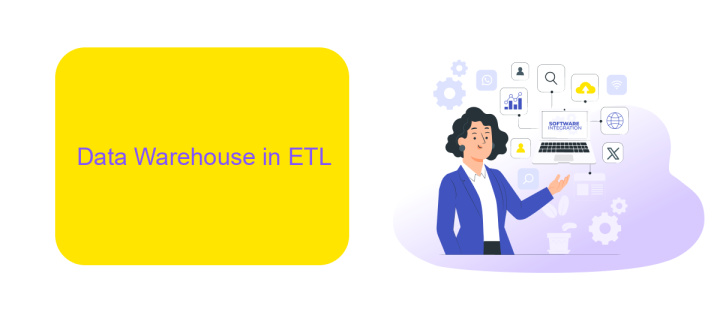What is Data Warehouse in ETL
A Data Warehouse in the context of ETL (Extract, Transform, Load) is a centralized repository designed to store, manage, and analyze large volumes of data from multiple sources. It plays a crucial role in business intelligence, enabling organizations to consolidate disparate data, perform complex queries, and generate insightful reports to drive informed decision-making processes.
Introduction
Data warehousing is a critical component in the realm of ETL (Extract, Transform, Load) processes. It serves as the centralized repository where data from various sources is collected, stored, and managed. This centralized approach enables organizations to perform complex queries and generate comprehensive reports, which are essential for informed decision-making.
- Centralized data storage
- Improved data quality and consistency
- Enhanced query performance
- Scalability to handle large volumes of data
In the context of integrating various data sources, services like ApiX-Drive can be particularly useful. ApiX-Drive simplifies the process of connecting different applications and automating data flows, ensuring that your data warehouse is always up-to-date with the latest information. This seamless integration helps in maintaining data integrity and supports efficient data management practices.
Data Warehouse in ETL

A Data Warehouse in ETL (Extract, Transform, Load) serves as a centralized repository where data from various sources is collected, transformed, and stored for analysis and reporting. This process involves extracting data from different operational systems, transforming it into a consistent format, and loading it into the data warehouse. The primary goal of a data warehouse is to provide a unified, reliable source of truth that supports business intelligence activities and decision-making processes.
Effective integration between data sources and the data warehouse is crucial for seamless ETL operations. Tools like ApiX-Drive can simplify this integration by automating the data transfer process, ensuring that data from multiple systems is consistently and accurately moved into the data warehouse. By leveraging such services, organizations can reduce the complexity of their ETL workflows, minimize errors, and ensure that their data warehouse remains up-to-date with the latest information. This ultimately enhances the quality of insights derived from the data, leading to better strategic decisions.
Benefits of Using a Data Warehouse in ETL

Implementing a data warehouse in your ETL process offers numerous advantages that can significantly enhance your data management and analytics capabilities. A data warehouse serves as a centralized repository where data from various sources is stored, cleaned, and transformed for better accessibility and analysis.
- Improved Data Quality: By consolidating data from multiple sources, a data warehouse ensures consistency and accuracy, reducing the risk of errors and discrepancies.
- Enhanced Performance: Data warehouses are optimized for query performance, enabling faster data retrieval and more efficient reporting and analytics.
- Scalability: As your organization grows, a data warehouse can easily scale to accommodate increasing volumes of data without compromising performance.
- Better Decision-Making: With a centralized and reliable data source, decision-makers can access comprehensive insights and make informed decisions more quickly.
- Seamless Integration: Services like ApiX-Drive facilitate seamless integration between your data warehouse and various data sources, streamlining the ETL process and ensuring smooth data flow.
In summary, utilizing a data warehouse in your ETL process can lead to improved data quality, enhanced performance, and better scalability. Additionally, with tools like ApiX-Drive, integrating various data sources becomes effortless, making your ETL operations more efficient and reliable.
Considerations for Implementing a Data Warehouse in ETL

When implementing a Data Warehouse in ETL processes, it's crucial to consider several factors to ensure efficiency and scalability. First, assess the data volume and frequency of updates. This helps in choosing the right storage solutions and optimizing data retrieval times.
Next, consider the integration of various data sources. Tools like ApiX-Drive can simplify this process by automating data transfers between applications, ensuring that your data warehouse is always up-to-date with minimal manual intervention.
- Data Quality: Ensure that the data being ingested is clean and consistent.
- Scalability: Plan for future growth in data volume and user queries.
- Security: Implement robust security measures to protect sensitive data.
- Performance: Optimize ETL processes to reduce load times and improve query performance.
Finally, maintain thorough documentation and regular monitoring. This ensures that any issues can be quickly identified and resolved, keeping your data warehouse reliable and efficient. Proper planning and the right tools can significantly streamline the implementation process.


Conclusion
In conclusion, a data warehouse plays a critical role in the ETL process by providing a centralized repository for storing and managing large volumes of data from various sources. It enables organizations to perform complex queries and generate insightful reports, leading to more informed decision-making. The integration of data from disparate systems into a unified data warehouse ensures data consistency, accuracy, and accessibility, which are essential for business intelligence and analytics.
Furthermore, leveraging tools like ApiX-Drive can streamline the integration process by automating data transfers between different platforms and applications. This not only reduces the manual effort involved but also minimizes the risk of errors and enhances data reliability. As businesses continue to evolve and generate more data, the importance of an efficient and well-structured data warehouse in the ETL process cannot be overstated. Investing in robust integration solutions and data management strategies will undoubtedly yield long-term benefits for any organization.
FAQ
What is a Data Warehouse in ETL?
Why is a Data Warehouse important in ETL processes?
What are the main components of a Data Warehouse?
How does ETL work in a Data Warehouse?
What tools can be used to automate ETL processes for a Data Warehouse?
Apix-Drive will help optimize business processes, save you from a lot of routine tasks and unnecessary costs for automation, attracting additional specialists. Try setting up a free test connection with ApiX-Drive and see for yourself. Now you have to think about where to invest the freed time and money!

